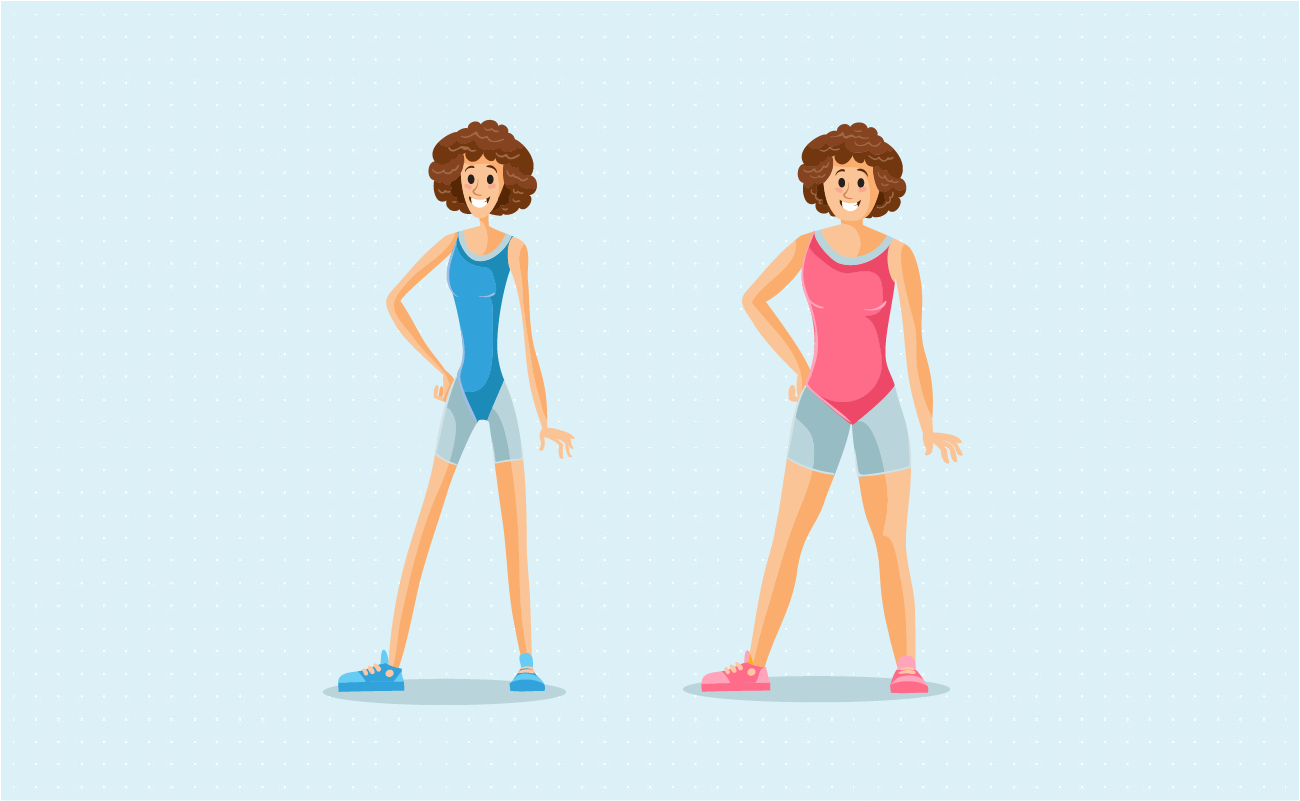Life
 Weight Gain Planning Calculator
Weight Gain Planning CalculatorThis calculator makes it easy for people interested in gaining weight to see how much they will need to increase their calorie consumption to reach their goals. Enter your age, height, weight, goal and how long you have to achieve your goal and we will suggest how many calories you would need to consume daily in order to reach your goal. After you have reached your goal we will also estimate the required calories to maintain your new weight.
Note: if you are able to measure your body composition you will get more accurate Total Daily Energy Expenditure (TDEE) results from this calculator by entering your body fat percentage. As you put on muscle mass it will also change your body composition, so it makes sense to re-check your composition periodically and recalculate your goals based on your performance to date.
Authored by Jose Abuyuan on November 11, 2019

Maintaining a healthy weight isn't just about losing the excess pounds. Although much of the popular attention has been directed to shedding pounds, some people encounter the opposite problem. Being underweight is often a symptom of malnutrition and can have a variety of root causes. It can lead to all sorts of medical problems if left unaddressed.
Much like losing weight, gaining is more than a matter of numbers. Whether you are trying to gain back mass that you have lost through health issues or have fitness goals that require a desired range, you would need to pack on the new pounds conscientiously. The last thing you need is trading one health problem for another.
People are usually defined as underweight based on their body mass index (BMI). This number is an effective shorthand measure for non-athletes, calculated based on body mass relative to a person's height, gender, and age. An underweight person would usually be defined as a person whose BMI number is below 18.5. People who weigh exactly the same may be overweight or underweight based on their height, age, and gender.
Being underweight is often the result of the body expending more calories than it consumes. The leading cause of being underweight is malnutrition. Whether through circumstance or terrible choices, eating a poor diet may not provide your body with sufficient calories to fuel itself. People who are malnourished or underweight are often lethargic. Malnutrition may also deprive the body of spare proteins with which to repair itself, or of fat reserves to provide fuel at rest. Moreover, the lack of trace elements like calcium may cause your bones to become brittle and weak.

Some people who live active lifestyles may have lower-than-average body weights while still having a healthy intake of food. If you have questions about your health or have experienced sudden, rapid, or unexpected weight loss, consult your doctor immediately. You should also work with your physician to develop a suitable dietary program to help you attain your ideal weight goals.
For some people, malnutrition is often a secondary condition to a different health issue. You might, for instance, be placed on restrictive diets for a prolonged period due to a host of medical contraindications; as a result, you may not always receive the right amount of calories to stay at a healthy weight. People with a variety of acute or chronic diseases such as infections, celiac disease, cancer, or thyroid issues often report a loss of appetite, as do people who have recurring mental health illnesses like depression or eating disorders like bulimia. If you suspect that you have these issues, consult your doctor.
For others, a low body mass is almost expected. If you live an active, healthy lifestyle, you may not see any noticeable amount of gain even if you eat heavily, due to the number of calories you expend every day. Likewise, you may be one of the lucky few born with a genetic predisposition to higher metabolisms and smaller appetites, which make you gain slower than other people.

Much like people with excessively heavy, underweight individuals face many health problems. People who are underweight are at risk of osteoporosis and anemia. They may also have significantly weaker immune systems, which can make them more vulnerable to infection and other diseases. This is an especially critical concern for people recovering from long-term illness; being underweight may make them immunocompromised and leave them vulnerable to secondary infections.
Some groups of people are more vulnerable to the effects of being underweight than others. Children and teenagers all need plenty of nutrition to grow. Being chronically underweight and undernourished may lead them to key developmental delays that would affect them later in life. Men, in general, have been found to be at a greater risk of health issues from being both overweight and underweight.
Underweight women, meanwhile, may encounter fertility issues due to irregular or absent periods. Besides having trouble conceiving children, they may also beat an increased risk of various health complications during pregnancy and childbirth.
People who are underweight because of health conditions may need to bring their body mass up to regain or maintain their long-term physical wellbeing. In addition, elderly individuals who shed pounds unexpectedly, pregnant women, and people who have recovered from a serious illness may also need to gain mass to help bolster their immune system and prevent further health complications.
Of course, not everyone who wants to gain weight is necessarily underweight. Some, for instance, may want to gain mass to align better with their fitness goals. Athletes may want to attain a specific weight class to meet competitive criteria. Naturally lean people may want to add muscle mass or fat in certain areas of their body.

Regardless of the reasons, gaining weight should be a long-term process built through healthy methods. A diet plan aiming to help you gain lean mass should not only aim to improve your overall caloric intake but also ensure the right mix of nutrients to develop your body in the long run. Moreover, a healthy diet can prevent further problems arising from malnutrition.
Besides a lower caloric intake, the other main obstacle you might encounter is a smaller appetite. Small appetites can make you feel full quickly; this setback can slow down your intake of calories and keep you from attaining your goals.
Appetite loss can come from various sources, among them medical problems that may need to be resolved before any progress can be made. If you are not ill, you can usually work around your higher-than-average metabolic rates by improving your overall appetite. Spreading your meals out over the course of a day, for instance, might be enough to encourage you to gradually eat more with every meal. People looking to lose often drink water before each meal to feel full sooner. People looking to gain can add calorie dense foods like butter or peanut butter to their meals & eat snacks like nuts throughout the day.
Of course, just because you should eat more doesn't mean the meals have to be a chore. Add a bit of extra toppings to your meal to make each dish just a little more scrumptious (and a lot more calorie-dense). You can also have your cake and eat it, too; treating yourself out more with guilty pleasures can be a reasonable part of a diet plan structured around building body mass, but do be careful to avoid overindulging.

One of the best ways to make lasting and healthy gains is through muscular development. A well-planned exercise regimen, when paired with a balanced diet that is rich in protein, can help you not only gain the desired weight but also achieve general physical fitness, which can help you maintain and achieve other health goals. Ask your doctor if a workout program is right for you.
If you're aiming for muscular development, a program that focuses on strength training is the way to go. Strength training works quickly; you will find almost immediate gains following the first few sessions. In addition, muscular development also requires plenty of fuel; you'd be helping boost your appetite along with every gym session.
Make sure to eat the appropriate amount of food after every workout to avoid risks associated with over-exercising & inadequate down time. Injuries can be a colossal setback to your fitness goals. To mitigate such risks most people serious about fitness work on various different muscle groups each day by assigning their arms, back, and legs muscle groups as the primary focus of various days of the week with a different group targeted on each subsequent day.
Some people report that they find drinking while having a meal increases their feelings of satiety; the presence of fluids fill them up before they can eat enough. If this happens to you, it might be high time to refrain from drinking anything during your main meals. You could either drink shortly after or a half an hour later.
Likewise, you may also reconsider the beverages you drink besides water. Some drinks—such as coffee, —may fill you up with nary a calorie to count for it. Instead of your usual morning cup, you might instead consider fruit juices or shakes based on milk, which are not only more nutritious but are also higher in calories. If you prefer drinking your meals on the go, meal-replacement shakes may be also be a good alternative.

Food is a primary factor in managing your body mass. Just because you are trying to gain mass doesn't mean you should slovenly indulge in junk food with reckless abandon. Ideally, the new weight gained should largely come from a healthy mix of bone mass, adipose tissue, and muscle mass. In the long run, choosing nutritious, calorie-dense foods rather than those rich in empty calories is a crucial component in gaining mass and maintaining a healthy body weight.
The types of foods you should eat depend heavily on what your goals are. In general, a balanced diet with a larger-than-average proportion of calories might be enough for your goals if you just want to gain back a few pounds. If, however, you want to add a specific type of weight, you might expect to change up your diet plans.
Protein sources are some of the best foods to help build healthy body mass. Proteins are a key component in tissue building and are the most important macronutrient for gaining strength. Strength training enthusiasts attest to the importance of protein sources like lean red meats and eggs helping build strong and dense musculature.
In addition, dairy products such as milk and cheese not only provide a rich, high-calorie source of protein but also deliver the trace element calcium, which can help strengthen your bones and counteract any threat of osteoporosis.
Although protein is the most effective component of healthy weight gain, it comes with the challenge of being very satiating, which can quickly keep you from reaching your target calorie intake. Get the best of both worlds by choosing a good proportion of protein (about 0.03 ounces) per pound of body weight
Protein and carbohydrates contain 4 calories per gram. Fat contains 9 calories per gram.
Satiating and calorie-dense, fatty foods make a delectable addition to your daily diet. Choose sources of healthy fats such as nuts, peanut butter, and avocadoes, and intersperse them liberally in both your main meals and snacks. Fats can also be added in the form of oils and dressings on your favorite meals.

Besides fats, you may also eat your fill of a heavy assortment of carbs. Carbohydrate-rich meals such as whole-grain breads, pastas, and cereals provide you with a quick source of energy.
Regardless of your goals, you shouldn't be too hung up on meeting a specific criteria quickly, especially if your main goals are not strictly health-based. You have very little control of where your mass will end up, whether as fat or as muscle, since these are largely determined by your genetics. Tailor your goals based on a realistic expectation of your body type and always put your health before any other objectives.
Although many products such as supplements and creatine shakes are marketed as magic bullets, they are largely just tangential aids at best. Use them as directed and sparingly, but don't get hung up on marketing hype.
In most cases, your should expect to gain around a pound a week, or four pounds a month. Much like with losing excess body mass, you shouldn't be too preoccupied on speed. Because quick results are often neither manageable, healthy, nor (as people with the converse problem know) lasting, you shouldn't put too much emphasis on gaining weight faster than recommended. Resist the temptation to go overboard on unhealthy fattening foods. You'd be a lot happier with the results if you take your sweet time.
Jose Abuyuan is a web content writer, fictionist, and digital artist hailing from Las Piñas City. He is a graduate of Communication and Media Studies at San Beda College Alabang, who took his internship in the weekly news magazine the Philippines Graphic. He has authored works professionally for over a decade.